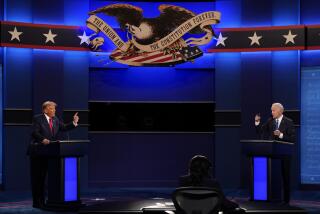Don Hewitt’s Pioneering Spirit Endures
- Share via
NEW YORK — Don Hewitt’s memoir is titled “Tell Me a Story,” an appropriate name, he says, because that’s what viewers crave from reporters: a good story.
Hewitt, creator and executive producer of “60 Minutes,” still loves to tell stories. That is evident from the tales he vividly recounts in his new book, subtitled “Fifty Years and ’60 Minutes’ in Television.” He still marvels at all of the things he has chronicled: documenting Frank Sinatra recording “It Was a Very Good Year,” broadcasting Richard Nixon and John F. Kennedy in the first televised presidential debate and covering the beginnings of the space program.
At 78, Hewitt has been the world’s visual historian for half a century, having joined CBS during the infancy of TV news in 1948. His career has spanned the likes of legends Edward R. Murrow and Walter Cronkite to the new generation of Meredith Vieira and Christiane Amanpour. But while TV news has changed dramatically, Hewitt insists on staying the same. That, he says, is how “60 Minutes” has managed to remain among the 10 most watched shows on television for the past 23 seasons.
“When you get to be my age and you have a moderately successful life, you begin to see patterns that have served you well,” Hewitt says. “I stumbled upon a formula that works for me. When you’ve been around as long as I have and you’ve done everything--I was at the beach in Normandy; I was at Queen Elizabeth’s coronation; I went around the world with Eisenhower, with Kennedy, with Lyndon Johnson; I’ve had the top news broadcast in television for the last 33 years--it’s easy to get set in your ways.”
That kind of stability is rare in an industry where executives and reporters are known for bouncing from network to network. But Hewitt has managed not only to stay at CBS for more than 50 years, he also has remained at the helm of “60 Minutes” since its start in 1968.
In his dimly lit office on West 57th Street, overlooking the Hudson River, Hewitt sits behind his massive L-shaped desk, one foot resting on a garbage pail, leaning back in a cushy leather chair. When he starts recounting life in TV news, his voice gets low, and he speaks like a grandfather remembering the old days.
“I’m a man who pinches himself every morning to remind himself that life smiled on me, and I’m not sure I know why,” Hewitt says. “Everybody else who works here is better educated than I am; they’re better read than I am. But I kind of identify with America. This is the best news organization in the business, and it’s kind of mine. I invented it.”
When Hewitt proposed a newsmagazine that “could look into Marilyn Monroe’s closet, so long as we looked into Robert Oppenheimer’s laboratory, too,” network executives were less than enthused. It was barely approved, and as a result Hewitt is fond of saying things like, “The fact that we were the No. 1 show in television four times in the last 23 years was the biggest surprise to me, as it was to anyone else.”
*
Over the years, “60 Minutes” has remained one of the most watched broadcasts on TV. Admittedly, it never attracted that young demographic group coveted by advertisers. But, Hewitt says, it got the attention of the right people--average Americans.
When the show began in 1968, it was on at 10 p.m. every other Tuesday. Soon after, it moved to Sundays at 7 p.m., where it has remained ever since. And over the years it has managed to compete with--and defeat--some powerful shows in the Nielsen ratings. For example, during the 1982-1983 season, “60 Minutes” was the No. 1 program, beating “Dallas.” It was the top show from 1991 through 1994. Since “ER” and “Friends” came on the scene in 1994, “60 Minutes” has remained in the top 10.
For Hewitt, the ratings success has provided the kind of freedom from the network’s budgetary bean counters that’s decidedly rare in these days of cuts in TV news divisions.
“When I came in here, nobody ever made money from doing the news. It was a service you performed, and in turn the FCC gave you a license to broadcast,” Hewitt says. “This broadcast was the first time that news ever became a major moneymaker. We’ve made $2 billion since we’ve been on the air--not gross, net. It doesn’t hurt to be a big moneymaker, because that’s how they leave you alone.”
One highlight from Hewitt’s career was the 1960 presidential debate between Nixon and Kennedy. It was the first time a presidential debate was televised, and it changed the course of history. With TV being a relatively new medium, Nixon didn’t know how pale and unkempt he looked compared to Kennedy’s tanned, crisp, made-up complexion. The camera accentuated all of Nixon’s flaws. Many historians believe that Nixon’s appearance on that TV broadcast helped cost him the election.
But Hewitt says that broadcasting the debate changed more than just the outcome of that one race.
“The debate between Nixon and Kennedy was the worst night in American television,” Hewitt says. “That was the night that television and politics realized how much they have to offer each other. They got engaged, eventually got married--[politicians] for the love, and we for the money--and ruined American politics. At the cornerstone of American politics there are two words: freely elected. But [candidates are] not; they’re expensively elected.”
Hewitt has no intention of slowing down. “I dread the idea of retiring. Nobody in this business has ever had more fun, has ever had a better life because of it and has [less] desire to ever retire.”
More to Read
The complete guide to home viewing
Get Screen Gab for everything about the TV shows and streaming movies everyone’s talking about.
You may occasionally receive promotional content from the Los Angeles Times.






